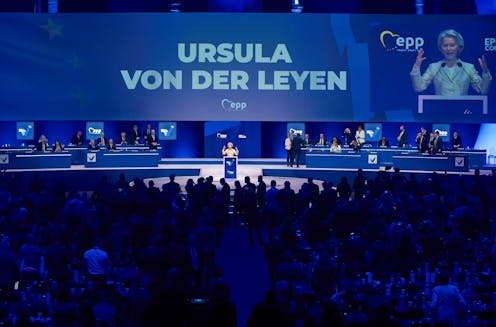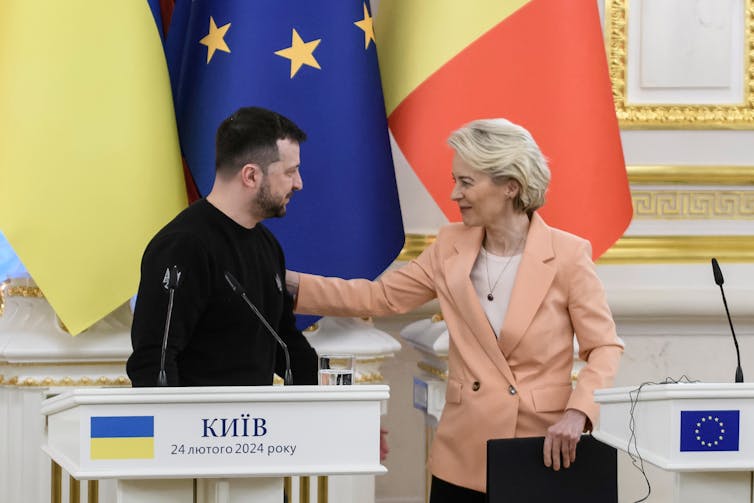
Almost 400 million European citizens are due to vote for representatives from their country to the European Parliament between June 6 and 9. The results of the elections will have an influence on who becomes the next president of the European Commission, one of the most powerful jobs in European politics.
The position is currently held by Ursula von der Leyen, who in 2019 became the first woman to lead the commission. For her term to be extended to 2029, the EU’s 27 national leaders must first nominate her for the job. Then she must be backed by a majority of the 720 new European Parliament members.
Last time around, she was not running in the campaign and her nomination came as a surprise. But this year she is the lead candidate for the centre-right European People’s Party (EPP) and is doing all she can to boost what has become an increasingly shaky bid for a second term.
There are intense debates among national leaders and in the European Parliament over issues such as the future of European integration and progress in key areas including climate change. It’s looking like a challenging feat for von der Leyen to build the majority she needs in both EU institutions to keep her job.
She was elected in 2019 by a very narrow margin, with a majority of just nine votes, even after making substantial promises to different political groups. The groups that supported von der Leyen last time round will have expected her to keep her policy promises, and they will assess her performance in their decisions about re-electing her. So, it makes sense to take stock of her achievements.

Von der Leyen has had to respond to crisis from almost her first day in the job. She was confronted by a global pandemic shortly after taking office. Then, just two years later, she was beset with the biggest war on European soil since 1945.
At the same time, there’s been democratic backsliding among member states, while Eurosceptic and populist governments have been brought to power in several countries including Slovakia, Italy, and, most recently, the Netherlands.
Strong leadership is needed during a crisis, and a strong leader is certainly what von der Leyen has become. She played a crucial part in developing the EU’s strategy for manufacturing and deploying COVID vaccines. And she has made strides on achieving “equality for all” – one of the major priorities of her commission.
Lawmakers passed legislation promoting pay transparency and equality in the job market, and parliament has approved new rules on tackling violence against women and domestic violence.
She has shown strong leadership in response to Russia’s war in Ukraine. Von der Leyen was the first European politician to travel to Kyiv after the invasion, and to raise the idea of Ukraine’s accession to the EU. Her commission was also key in preparing sanctions against Russia.
The European Green Deal, which von der Leyen has called “Europe’s man on the moon moment”, was another key priority. Under her leadership, the green deal led to landmark legislation that set the EU on the path to a green transition.
However, many of its concrete measures have been torn apart in response to fierce protests from farmers. In 2023, her own political group, the EPP, joined far-right lawmakers in voting against a bill aimed at restoring the EU’s damaged ecosystems. The final text included major concessions and the law’s targets were watered down.
Strong leadership in difficult times
Leading the EU is like steering a huge vessel, and stormy waters make it even more difficult. When the situation escalated in Israel and Gaza in late 2023, von der Leyen immediately adopted a pro-Israel stance, ignoring EU member states with different positions on Israel and Palestine.
She has also often been criticised over her reluctance to take rule of law infringements to the European Court of Justice. Increasing numbers of attacks on media freedom in Italy will again test whether von der Leyen will launch a legal case.
However, legal action is unlikely as it could harm von der Leyen’s efforts to secure the support of Italy’s far-right prime minister, Giorgia Meloni, in her bid for a second term. During an election debate at the European Parliament on May 23, von der Leyen described Meloni as “pro-rule of law”.
Her leadership style is certainly not without flaws. Her rivals have bemoaned the fact that she communicates with a limited number of trusted advisers and is not sufficiently connected to her commission.
In an interview with the Financial Times, the centre-left’s lead candidate for the commission presidency, Nicolas Schmit, branded von der Leyen’s style of leadership as “unacceptable”, saying she has consistently excluded her commissioners from decision making.
But, overall, her response to crisis has been swift and determined, and even critics show some admiration for her work ethic and dedication. The co-chair of the European Parliament’s Green political group (and hence not a political ally), Philippe Lamberts, even said: “She is arguably the best since [Jacques] Delors.” Between 1985 and 1995, Delors served as the commission president and played a key role in creating the EU’s single market and monetary union.
She has also made herself known to the wider public. According to a recent study, von der Leyen “is now a household name”. About 75% of Europeans “are able to correctly identify von der Leyen’s name and recognise her face” – a much higher percentage than for any of her predecessors.
Reelection will be no easy task for von der Leyen, despite being in pole position and her good performance overall. Yet performance is just one out of many factors that influence the choice for the EU’s top jobs. By mid-July, we should know whether von der Leyen has done enough.
Gabriele Abels does not work for, consult, own shares in or receive funding from any company or organisation that would benefit from this article, and has disclosed no relevant affiliations beyond their academic appointment.
This article was originally published on The Conversation. Read the original article.







